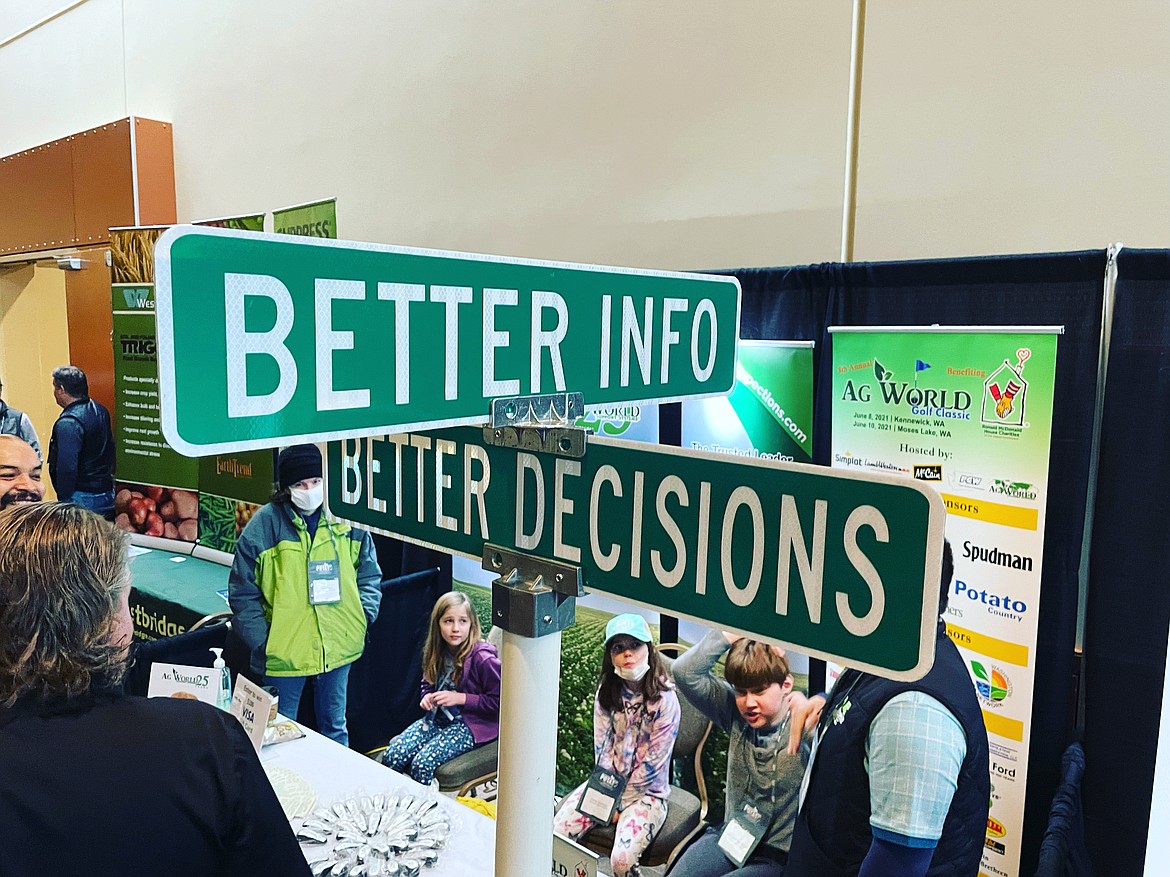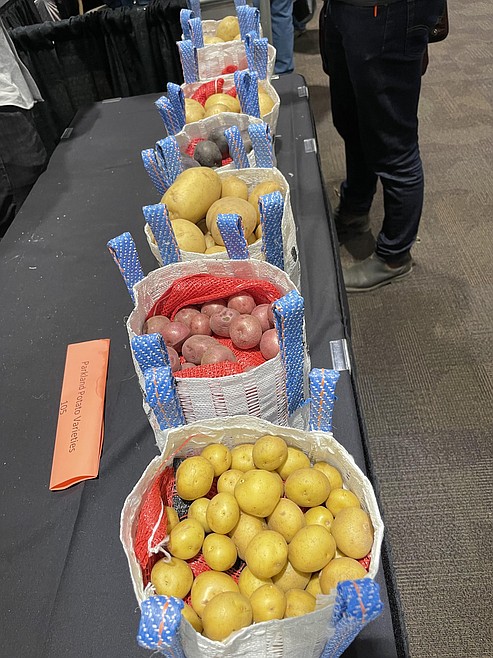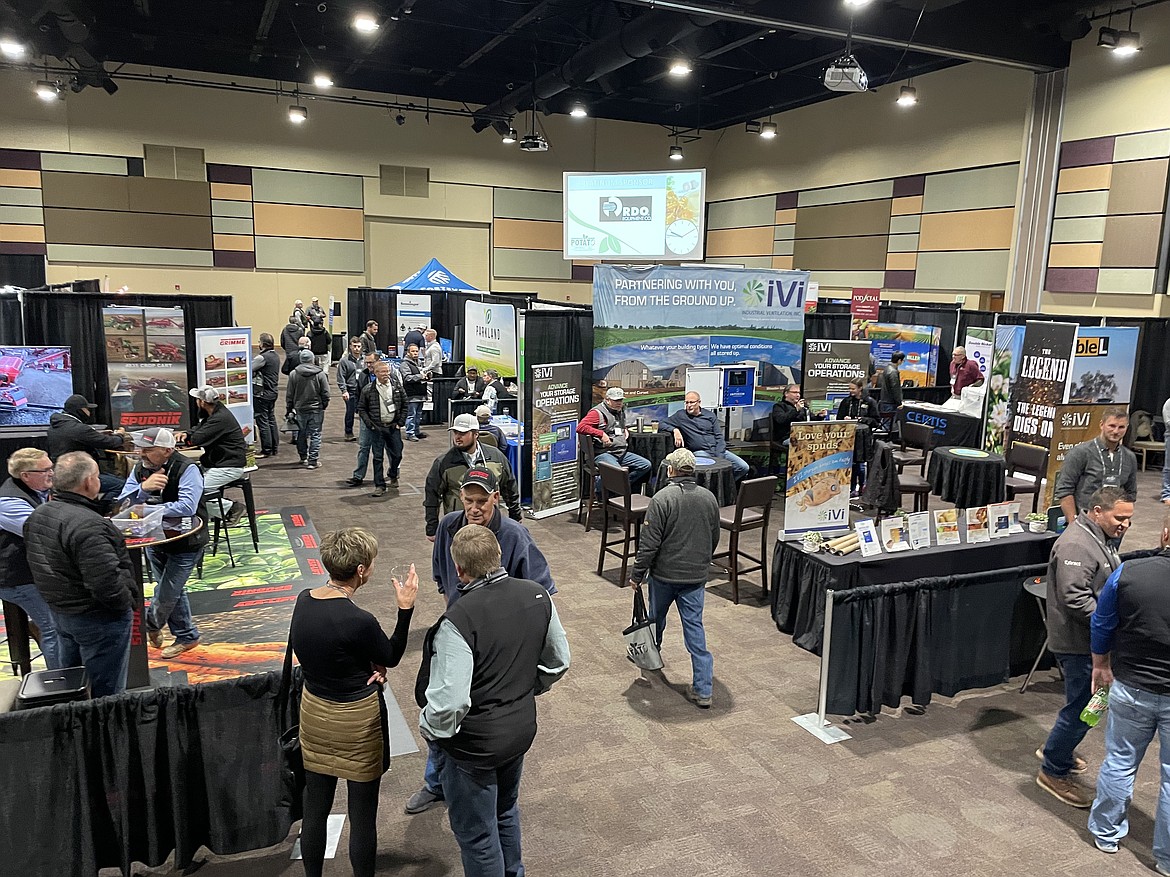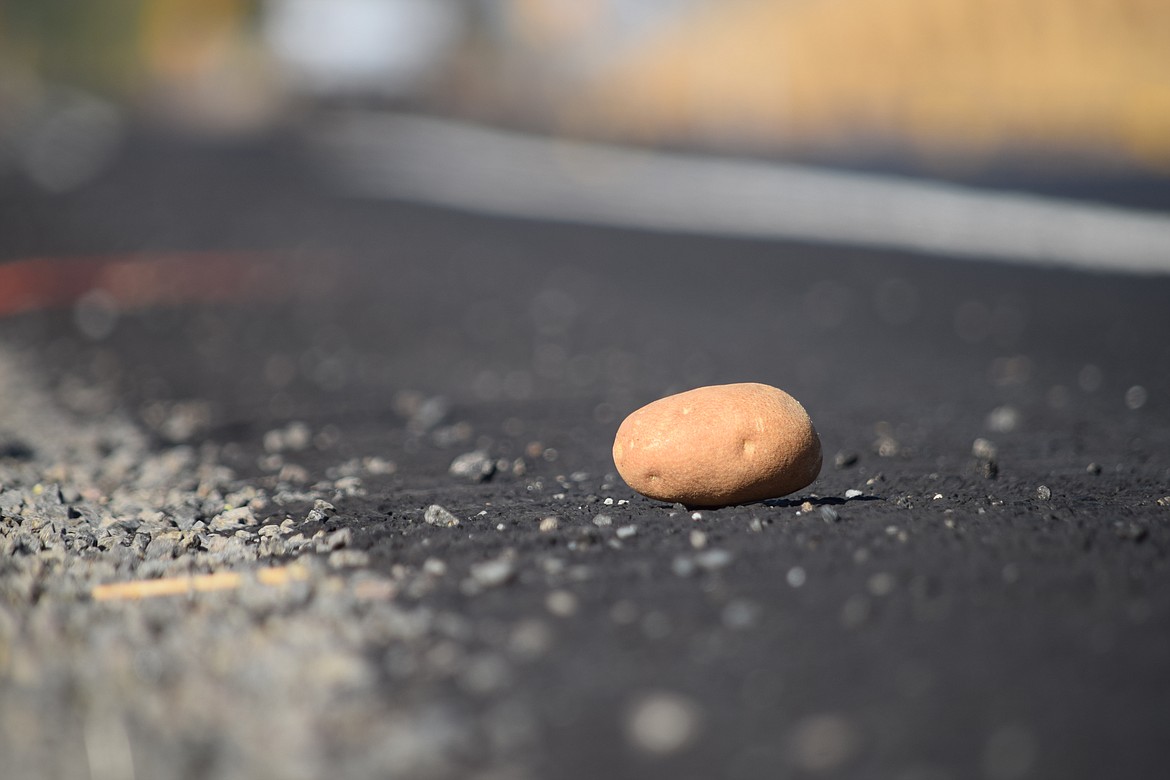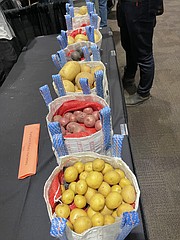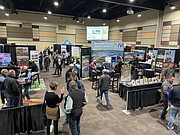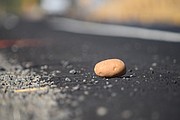Tater talk: Potato conference equips growers
PORTLAND, Oregon — Howard Goldstein is on a mission on behalf of potatoes.
“Unlike the consumer, who absolutely loves potatoes, and nothing’s going to stop that, that love isn’t ubiquitous,” said Goldstein, a senior executive with the Chicago-based public relations firm Foodminds. “And there are a few leading institutions that have, for decades, tried to recast potatoes in a negative light.”
One of the ways opponents of potatoes are trying to do that, Goldstein said, including having potatoes reclassified as something other than vegetables.
“They don’t want potatoes. When we talk about vegetables and eating vegetables, they don’t want potatoes as part of that conversation. And that’s absolutely absurd,” he said.
Goldstein said Foodminds uses scientific data and findings to help promote better nutrition and food choices, and assists companies with the best ways to communicate the advantages of their crops or products. He’s scheduled to give the keynote address to this year’s Washington-Oregon Potato Conference, scheduled to take place at the Three Rivers Convention Center in Kennewick on Jan. 25 and 26.
According to Gary Roth, chairman of the Oregon Potato Commission, the annual conference is a big deal for regional potato producers and gives farmers from both states a chance to come a listen to the latest in academic research, hear about the latest technology, and get a chance to spend time with other growers.
“It’s a really big deal,” Roth said. “We try to keep it relevant.”
So, Goldstein will be speaking to the converted when he talks about the nutritional value of potatoes. According to Goldstein, potatoes were cast as a nutritional villain because of something called the glycemic index, which was developed by researchers in the late 1970s and early 1980s to measure how quickly the body breaks down carbohydrates and raises blood sugar levels. Goldstein said the index was developed for a very narrow population — Type I diabetics — and doesn’t work well for the population at large.
“In general, carbohydrates are the number one vehicle to get other nutrients in the diet like potassium, fiber and whole grains,” Goldstein said. “By ignoring the role of carbohydrates to provide these nutrients, you’re providing a disservice to the consumer.”
Goldstein said the goal of his presentation will be to use nutrition research to demonstrate the value of potatoes, and that it is possible to communicate this to a public at large that already loves potatoes.
“That’s the nutshell of it, the potato skin, if you will,” he said.
In addition to Goldstein’s keynote address, this year’s potato conference will include presentations from both Roth and Washington Potato Commission Executive Director Chris Voight, as well as updates from PotatoesUSA CEO Blair Richardson and National Potato Council CEO Kam Quarles.
There will also be the usual sessions outlining the latest research on potatoes and heat stress, pests such as nematodes, viruses and fungi, breeding programs, soil health and pesticide use. According to Tressa Radach, office manager for the Washington Potato Commission, this year’s conference will feature an expanded Spanish-language session, which will take place on Thursday.
“We did expand the room space so more people can attend,” Radach said. “Last year there was a lot of demand.”
Roth said this year’s conference will also include the trade show, which allows growers to meet retailers and producers of agricultural products as varied as tractors and harvesters to sprinkler heads and bag makers. This is important as Roth noted the 2022 potato harvest in Oregon was good but not superb, and potato farmers need whatever edge they can get.
“Yields were down, on average, 12-15%,” he said.
Radach said last year’s conference drew in 2,300 attendees, and this year’s show looks set to draw an even bigger crowd.
“We’re really excited, and there are a lot of vendor requests,” she said. “People love our show.”
Attendance is expected to provide a broad audience for the vendors that signed up.
“We’re anticipating as high an attendance as we have ever had,” Roth added.
Charles H. Featherstone can be reached at cfeatherstone@columbiabasinherald.com.
2023 Washington-Oregon Potato Conference schedule
Monday, Jan. 23
1-4 p.m. Booth Move In
5-9 p.m. Early Bird Reception (SpringHill Suites)
Tuesday, Jan. 24
7 a.m.-5:15 p.m. Registration Opens
8 a.m. - 10 a.m. Booth Move In
9 a.m. - 11 a.m. Ag Innovation: Cutting-Edge Ag Tech
9 a.m. Welcome: Matthew Blua, Session organizer/moderator
9:05 a.m. Restrain-Natural replacement to CIPC, Emily Merk, Restrain
9:25 a.m. Black is the New Green: Biochar as a Soil Amendment. Myles Gray, Myno Carbon
9:45 a.m. Advances in Nematode Diagnostics, Sam Chavosi, Agnema
10:05 a.m. Farming Technology Outlook. David Gordillo, John Deer
10:25 a.m. Panel Discussion
11 a.m. Adjourn
10 a.m.-5 p.m. Trade Show
1:30-5 p.m. Cultivar Performance Workshop
1:30 p.m. Cultivar display – view the clones and cultivars from this year’s trials
1:45 p.m. Field Performance and Agronomy Updates of New Clones & Cultivar, Mark Pavek, Zach Holden, Rudy Garza, Vito Cantu, WSU – Pullman, Washington
2:10 p.m. 2022 Postharvest Storage & Quality Evaluations Jake Blauer & Nora Fuller WSU – Pullman, Washington
2:35 p.m. Trait Discovery and Potato Germplasm Improvement, Max J. Feldman, USDA-ARS, Prosser, Washington
3 p.m. Oregon Potato Breeding & Variety Development Program Update, Vidyasagar ‘Sagar’ Sathuvalli, OSU – Hermiston, Oregon
3:25 p.m. Break
3:45 p.m. A New Face for the Potato Variety Management Institute, Jeanne Debons & Jenny Gentry, PVMI Bend, Oregon and Moscow, Idaho
4:10 p.m. Becca Rose, A Medium to Late Maturing Variety with Bright Red Skin and White Flesh, Rhett Spear, University of Idaho and Rich Novy USDA-ARS, Aberdeen, Idaho
4:30 p.m. Adjourn
5 p.m. - 8 p.m. Trade Show Reception & Potato PAC Auction (TRCC)
Wednesday, Jan. 25
7:30 a.m. Continental Breakfast
7:30 a.m.-4 p.m. Registration Opens
7:55 a.m.-12 p.m. General Sessions
8 a.m. How Potatoes Cope with Heat, Carrie Wohleb, WSU Extension, Moses Lake
8:25 a.m. Assessment of Wound Healing Intervals for Ideal Stand Establishment, Jake Blauer, WSU, Pullman
8:50 a.m. How Do We Help Potato Growers Combat the Root-Knot Nematode Meloidogyne chitwoodi?, Cynthia Gleason, WSU, Pullman
9:15 a.m. PVMI: Familiar Face, New Beginning, Jenny Gentry, Executive Director
9:30 a.m. Break
9:45 a.m. Fusarium Dry Rot in The Face of Fungicide Resistance and Potato Variety Selection, Kasia Duellman, University of Idaho, Idaho Falls
10:10 a.m. Oregon Potato Commission Update, Gary Roth, Executive Director
10:35 a.m. Washington State Potato Commission Update, Chris Voigt, Executive Director
11 a.m. KEYNOTE: Alliance for Potato Research and Education: Leading with Science to Transform Potato Perceptions, Howard Goldstein, FoodMinds
12 p.m. Adjourn
12-1:30 p.m. Hosted Potato Bar, Trade Show, Convention Center Ken Frost, Moderator
9 a.m. - 5 p.m. Trade Show
11 a.m.-12 p.m. Keynote, Howard Goldstein
12-1:30 p.m. Hosted Potato Bar
1-4:35 p.m. General Sessions
1 p.m. New Insights into Factors Affecting Beet Leafhopper and Potato Purple Top Epidemiology, Tiziana Oppedisano, OSU, Hermiston
1:25 p.m. Fighting our Foliar Foes with Fungicides, Jeff Miller, Miller Research, Acequia, Idaho
1:50 p.m. Potatoes USA Update, Blair Richardson, CEO
2:15 p.m. Overview of the Potato Breeding and Research Program in Aberdeen, Noelle Anglin, USDA-ARS, Aberdeen, Idaho
2:40 p.m. Break
2:55 p.m. Tracking the Origin of Ozette Potato, Hemant Kardile, OSU, Hermiston
3:20 p.m. Potato Sustainability Alliance Update, John Mesko, Executive Director
3:45 p.m. Double Whammy: Developing Strategies to Combat the Powdery Scab - Potato Mop Top Virus Disease Complex, Vamsi Nalam, Colorado State University, Fort Collins
4:10 p.m. Alternative Strategies to Control Powdery Scab: Immunostimulants and Genetic Engineering, Kiwamu Tanaka, WSU, Pullman
4:35 p.m. Adjourn
6-9 p.m. Leadership Recognition Banquet
Thursday, Jan. 26
7:30 a.m. Continental Breakfast
7:30 a.m.-12 p.m. Registration Opens
9 a.m. - 12 p.m. Spanish Language Program (TRCC Room CD)
8:45 a.m. Registration
9 a.m. Introductions. Moderator Joe Garcia
9:05 a.m. New Horizon Resources for the Community. Joe Garcia, New Horizons, Hermiston, OR
9:30 a.m. Understanding and Maintaining Worker Safety Under Smoky and/or Hot Conditions. Bradley Farrar, WA LNI
10:00 a.m. Break
10:15 a.m. Working Safely with Pesticide. Jeff Robison, WSDA Trainer
11:05 a.m. Personal Protective Equipment. William Sennett, WSDA Trainer
Noon Adjourn and Lunch
8:45 a.m. Registración
9 a.m. Introducciones. Moderador Joe Garcia
9:05 a.m. Recursos de New Horizon para la comunidad. Joe Garcia, New Horizons, Hermiston, OR
9:30 a.m. Comprender y mantener la seguridad de los trabajadores en condiciones de mucho humo y/o calor. Bradley Farrar, WA LNI
10 a.m. Descanso
10:15 a.m. Trabajando de manera segura con pesticidas. Jeff Robison, Entrenador de WSDA
11:05 a.m. Equipo de protección personal. William Sennett, Entrenador de WSDA
12 p.m. Termina el programa y almuerzo
8:05 a.m.-12 p.m. General Sessions
8:10 a.m. What a Commercial Potato Seed Survey and Field Trials Tell Us about the Economics of Planting Less Than Ideal Seed Lots, Alexa Hintze, WSU, Pullman
8:35 a.m. Identifying Applications and Bottlenecks for Remote Sensing in Potato: Assessment of Colorado Potato Beetle Host Preference as a Case Study, Max Feldman, USDA-ARS Prosser, Washington
9 a.m. National Potato Council Update, Kam Quarles, CEO
9:25 a.m. Effects of Type, Rate, and Method of Potassium Fertilizers on Yield and Quality in the Columbia Basin, Ray Qin, OSU, Hermiston
9:50 a.m. Break
10:05 a.m. Current Status of Nutsedge Management Strategies in Potato Production, Rui Liu, WSU Prosser
10:30 a.m. WSU Potato Research Updates on MH30, Potassium, and Variety-Specific Production, Mark Pavek, WSU, Pullman
10:55 a.m. Washington State University’s College of Agricultural, Natural, and Human Resources Sciences, Wendy Powers, CAHNRS Dean
11:10 a.m. Understanding Tobacco rattle virus Epidemiology in Potato Through Basic and Applied Assays, Kylie Swisher Grimm, USDA-ARS, Prosser, Washington
11:35 a.m. Systems Approach to Nematode Control in U.S. Potatoes, Cynthia Gleason, WSU, Pullman and Joe Kuhl, University of Idaho, Moscow
12-1 p.m. Lunch, Convention Center, Andy Jensen, Moderator
9 a.m.-2 p.m. Trade Show
10:15 a.m.-12 p.m. Social Event (location TBD)
12-1 p.m. Lunch (TRCC)
1 p.m.-4:10 p.m. General Sessions
1 p.m. Aphid Biology, Virus Transmission, and Why Losing Neonicotinoids Could Result in More Virus Disease, Andy Jensen, Northwest Potato Research Consortium
1:25 p.m. The Importance of Neonicotinoid Insecticides and How to Produce Potatoes in the Northwest Without Them, Alan Schreiber, Ag. Development Group, Eltopia, Washington and Tim Waters, WSU Extension,
1:50 p.m. Could Afidopyropen Be a New Tool for Management of Potato Leafroll Virus?Gina Angelella, USDA-ARS, Wapato, Washington
2:15 p.m. Break
2:30 p.m. Diagnostic Markers to Determine Races of Columbia Root-Knot Nematode and Their Application in Disease Management, Hu Shengwei, OSU, Hermiston
2:55 p.m. Developing Post-Harvest Methods to Assess Potential for Internal Defects, Roy Navarre, USDA-ARS, Prosser, Washington
3:20 p.m. Tank Mixing Fungicides and Insecticides for Control of Early Blight and Aphids, Tim Waters, WSU Extension, Pasco
3:45 p.m. Potato Soil Health: Where Have We Been and Where are We Going?, Ken Frost, OSU, Hermiston
4:10 p.m. Adjourn


